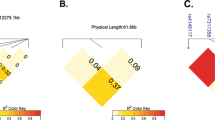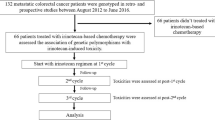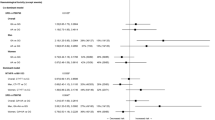Abstract
Resistance to antiemetic treatment with 5-hydroxytryptamine-3 receptor antagonist is an issue. This study evaluated the potential roles of ABCB1 and ABCG2 polymorphisms in antiemetic treatment resistance in patients with cancer previously enrolled in a randomized controlled trial. A total of 156 patients were evaluated for their responses to antiemetic therapy and then subdivided into granisetron or palonosetron groups. The genotypes were evaluated for their association with antiemetic efficacy in each treatment groups. Additional risk factors associated with complete response (CR) were examined using a multivariate regression analysis. No significant associations were identified for genetic polymorphisms in the palonosetron group. In the granisetron group, patients with ABCB1 2677TT and 3435TT genotypes had higher proportion of CR. In addition to ABCB1 polymorphisms, gender and cisplatin dose were associated with granisetron response by univariate analysis. Multivariate logistic regression analysis revealed that the ABCB1 3435C>T polymorphism and cisplatin dose were significant predictors of CR.
This is a preview of subscription content, access via your institution
Access options
Subscribe to this journal
Receive 6 print issues and online access
$259.00 per year
only $43.17 per issue
Buy this article
- Purchase on Springer Link
- Instant access to full article PDF
Prices may be subject to local taxes which are calculated during checkout


Similar content being viewed by others
References
Hickok JT, Roscoe JA, Morrow GR, King DK, Atkins JN, Fitch TR . Nausea and emesis remain significant problems of chemotherapy despite prophylaxis with 5-hydroxytryptamine-3 antiemetics: a University of Rochester James P. Wilmot Cancer Center Community Clinical Oncology Program Study of 360 cancer patients treated in the community. Cancer 2003; 97: 2880–2886.
Andrews PL . Physiology of nausea and vomiting. Br J Anaesth 1992; 69: 2S–19S.
Glaus A, Knipping C, Morant R, Böhme C, Lebert B, Beldermann F et al. Chemotherapy-induced nausea and vomiting in routine practice: a European perspective. Support Care Cancer 2004; 12: 708–715.
Molassiotis A, Saunders MP, Valle J, Wilson G, Lorigan P, Wardley A et al. A prospective observational study of chemotherapy-related nausea and vomiting in routine practice in a UK cancer centre. Support Care Cancer 2008; 16: 201–208.
Schmoll HJ, Aapro MS, Poli-Bigelli S, Kim HK, Park K, Jordan K et al. Comparison of an aprepitant regimen with a multiple-day ondansetron regimen, both with dexamethasone, for antiemetic efficacy in high-dose cisplatin treatment. Ann Oncol 2006; 17: 1000–1006.
Chawla SP, Grunberg SM, Gralla RJ, Hesketh PJ, Rittenberg C, Elmer ME et al. Establishing the dose of the oral NK1 antagonist aprepitant for the prevention of chemotherapy-induced nausea and vomiting. Cancer 2003; 97: 2290–3000.
Warr DG, Hesketh PJ, Gralla RJ, Muss HB, Herrstedt J, Eisenberg PD et al. Efficacy and tolerability of aprepitant for the prevention of chemotherapy-induced nausea and vomiting in patients with breast cancer after moderately emetogenic chemotherapy. J Clin Oncol 2005; 23: 2822–2830.
Hashimoto H, Yamanaka T, Shimada Y, Arata K, Matsui R, Koichi G et al. Palonosetron (PALO) versus granisetron (GRA) in the triplet regimen with dexamethasone (DEX) and aprepitant (APR) for preventing chemotherapy-induced nausea and vomiting (CINV) in patients (pts) receiving highly emetogenic chemotherapy (HEC) with cisplatin (CDDP): a randomized, double-blind, phase III trial. Proc Am Soc Clin Oncol J Clin Oncol, 2013 ASCO Annual Meeting Abstracts. Vol 31, No 15_suppl (May 20 Supplement), 2013: 9621.
Pollera CF, Giannarelli D . Prognostic factors influencing cisplatin-induced emesis. Definition and validation of a predictive logistic model. Cancer 1989; 64: 1117–1122.
du Bois A, Meerpohl HG, Vach W, Kommoss FG, Fenzl E, Course Pfleiderer A . Patterns, and risk-factors for chemotherapy-induced emesis in cisplatin-pretreated patients: a study with ondansetron. Eur J Cancer 1992; 28: 450–457.
Sullivan JR, Leyden MJ, Bell R . Decreased cisplatin-induced nausea and vomiting with chronic alcohol ingestion. N Engl J Med 1983; 309: 796.
Booth CM, Clemons M, Dranitsaris G, Joy A, Young S, Callaghan W et al. Chemotherapy-induced nausea and vomiting in breast cancer patients: a prospective observational study. J Support Oncol 2007; 5: 374–380.
Tonato M, Roila F, Del Favero A . Methodology of antiemetic trials: a review. Ann Oncol 1991; 2: 107–114.
Kaiser R, Sezer O, Papies A, Bauer S, Schelenz C, Tremblay PB et al. Patient-tailored antiemetic treatment with 5-hydroxytryptamine type 3 receptor antagonists according to cytochrome P-450 2D6 genotypes. J Clin Oncol 2002; 20: 2805–2811.
Tremblay PB, Kaiser R, Sezer O, Rosler N, Schelenz C, Possinger K et al. Variations in the 5-hydroxytryptamine type 3B receptor gene as predictors of the efficacy of antiemetic treatment in cancer patients. J Clin Oncol 2003; 21: 2147–2155.
Babaoglu MO, Bayar B, Aynacioglu AS, Kerb R, Abali H, Celik I et al. Association of the ABCB1 3435C>T polymorphism with antiemetic efficacy of 5-hydroxytryptamine type 3 antagonists. Clin Pharmacol Ther 2005; 78: 619–626.
Perwitasari DA, Wessels JA, van der Straaten RJ, Baak-Pablo RF, Mustofa M, Hakimi M et al. Association of ABCB1, 5-HT3B receptor and CYP2D6 genetic polymorphisms with ondansetron and metoclopramide antiemetic response in Indonesian cancer patients treated with highly emetogenic chemotherapy. Jpn J Clin Oncol 2011; 41: 1168–1176.
Tsuji D, Kim YI, Nakamichi H, Daimon T, Suwa K, Iwabe Y et al. Association of ABCB1 polymorphisms with the antiemetic efficacy of granisetron plus dexamethasone in breast cancer patients. Drug Metab Pharmacokinet 2013; 28: 299–304.
Choi EM, Lee MG, Lee SH, Choi KW, Choi SH . Association of ABCB1 polymorphisms with the efficacy of ondansetron for postoperative nausea and vomiting. Anaesthesia 2010; 65: 996–1000.
Zoto T, Kilickap S, Yasar U, Celik I, Bozkurt A, Babaoglu MO . Improved anti-emetic efficacy of 5-HT3 receptor antagonists in cancer patients with genetic polymorphisms of ABCB1 (MDR1) drug transporter. Basic Clin Pharmacol Toxicol 2015; 116: 354–360.
Hesketh PJ, Bohlke K, Lyman GH, Basch E, Chesney M, Clark-Snow RA et al. Antiemetics: American Society of Clinical Oncology Focused Guideline Update. J Clin Oncol 2016; 34: 381–386.
Takeuchi H, Saeki T, Aiba K, Tamura K, Aogi K, Eguchi K et al. Japanese Society of Clinical Oncology clinical practice guidelines 2010 for antiemesis in oncology: executive summary. Int J Clin Oncol 2016; 21: 1–12.
Roila F, Herrstedt J, Aapro M, Gralla RJ, Einhorn LH, Ballatori E et alESMO/MASCC Guidelines Working Group. Guideline update for MASCC and ESMO in the prevention of chemotherapy- and radiotherapy-induced nausea and vomiting: results of the Perugia consensus conference. Ann Oncol 2010; 21 (Suppl 5):v232–v243.
Schinkel AH, Wagenaar E, Mol CA, van Deemter L . P-glycoprotein in the blood-brain barrier of mice influences the brain penetration and pharmacological activity of many drugs. J Clin Invest 1996; 97: 2517–2524.
Yamamoto C, Murakami H, Koyabu N, Takanaga H, Matsuo H, Uchiumi T et al. Contribution of P-glycoprotein to efflux of ramosetron, a 5-HT3 receptor antagonist, across the blood-brain barrier. J Pharm Pharmacol 2002; 54: 1055–1063.
WHO. Expert Consultation. Appropriate body-mass index for Asian populations and its implications for policy and intervention strategies. Lancet 2004; 363: 157–163.
Sakaeda T, Nakamura T, Horinouchi M, Kakumoto M, Ohmoto N, Sakai T et al. MDR1 genotype-related pharmacokinetics of digoxin after single oral administration in healthy Japanese subjects. Pharm Res 2001; 18: 1400–1404.
Horinouchi M, Sakaeda T, Nakamura T, Morita Y, Tamura T, Aoyama N et al. Significant genetic linkage of MDR1 polymorphisms at positions 3435 and 2677: functional relevance to pharmacokinetics of digoxin. Pharm Res 2002; 19: 1581–1585.
Schwab M, Eichelbaum M, Fromm MF . Genetic polymorphisms of the human MDR1 drug transporter. Annu Rev Pharmacol Toxicol 2003; 43: 285–307.
Hesketh PJ, Aapro M, Street JC, Carides AD . Evaluation of risk factors predictive of nausea and vomiting with current standard-of-care antiemetic treatment: analysis of two phase III trials of aprepitant in patients receiving cisplatin-based chemotherapy. Support Care Cancer 2010; 18: 1171–1177.
Wong EH, Clark R, Leung E, Loury D, Bonhaus DW, Jakeman L et al. The interaction of RS 25259-197, a potent and selective antagonist, with 5-HT3 receptors, in vitro. Br J Pharmacol 1995; 114: 851–859.
Jordan K, Schmoll HJ, Aapro MS . Comparative activity of antiemetic drugs. Crit Rev Oncol Hematol 2007; 61: 162–175.
Hoffmeyer S, Burk O, von Richter O, Arnold HP, Brockmöller J, Johne A et al. Functional polymorphisms of the human multidrug-resistance gene: multiple sequence variations and correlation of one allele with P-glycoprotein expression and activity in vivo. Proc Natl Acad Sci USA 2000; 97: 3473–3478.
Hitzl M, Drescher S, van der Kuip H, Schäffeler E, Fischer J, Schwab M et al. The C3435T mutation in the human MDR1 gene is associated with altered efflux of the P-glycoprotein substrate rhodamine 123 from CD56+ natural killer cells. Pharmacogenetics 2001; 11: 293–298.
Drescher S, Schaeffeler E, Hitzl M, Hofmann U, Schwab M, Brinkmann U et al. MDR1 gene polymorphisms and disposition of the P-glycoprotein substrate fexofenadine. Br J Clin Pharmacol 2002; 53: 526–534.
Lohr L . Chemotherapy-induced nausea and vomiting. Cancer J 2008; 14: 85–93.
Hesketh PJ . Chemotherapy-induced nausea and vomiting. N Engl J Med 2008; 358: 2482–2494.
du Bois A, Meerpohl HG, Vach W, Kommoss FG, Fenzl E, Pfleiderer A et al. Course, patterns, and risk-factors for chemotherapy-induced emesis in cisplatin-pretreated patients: a study with ondansetron. Eur J Cancer 1992; 28: 450–457.
Hamaguchi K, Godwin AK, Yakushiji M, O'Dwyer PJ, Ozols RF, Hamilton TC . Cross-resistance to diverse drugs is associated with primary cisplatin resistance in ovarian cancer cell lines. Cancer Res 1993; 53: 5225–5232.
Acknowledgements
We thank all patients and medical staff who participated in this study. This work was supported by JSPS KAKENHI Grant Number 26860110.
Author information
Authors and Affiliations
Corresponding author
Ethics declarations
Competing interests
The authors declare no conflict of interest.
PowerPoint slides
Rights and permissions
About this article
Cite this article
Tsuji, D., Yokoi, M., Suzuki, K. et al. Influence of ABCB1 and ABCG2 polymorphisms on the antiemetic efficacy in patients with cancer receiving cisplatin-based chemotherapy: a TRIPLE pharmacogenomics study. Pharmacogenomics J 17, 435–440 (2017). https://doi.org/10.1038/tpj.2016.38
Received:
Revised:
Accepted:
Published:
Issue Date:
DOI: https://doi.org/10.1038/tpj.2016.38
This article is cited by
-
A randomized trial evaluating the association between related gene polymorphism and nausea and vomiting induced by cisplatin multi-day chemotherapy
BMC Medical Genomics (2023)
-
Economic analysis of palonosetron versus granisetron in the standard triplet regimen for preventing chemotherapy-induced nausea and vomiting in patients receiving highly emetogenic chemotherapy in Japan (TRIPLE phase III trial)
Journal of Pharmaceutical Health Care and Sciences (2018)
-
Prediction of chemotherapy-induced nausea and vomiting from patient-reported and genetic risk factors
Supportive Care in Cancer (2018)
-
Genetic risk factors for chemotherapy-induced nausea and vomiting in patients with cancer receiving cisplatin-based chemotherapy
Supportive Care in Cancer (2017)



